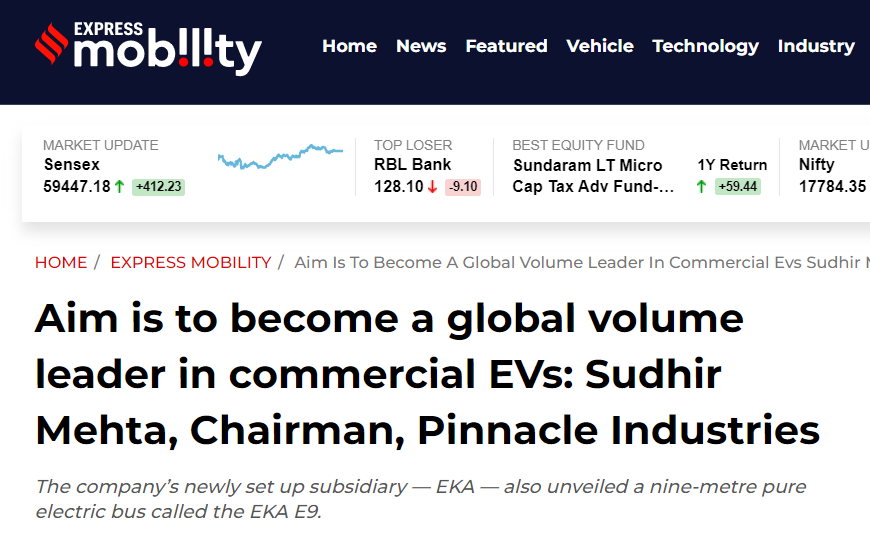The company’s newly set up subsidiary — EKA — also unveiled a nine-metre pure electric bus called the EKA E9.
Automotive components manufacturer Pinnacle Industries, which makes seats and interior products for commercial vehicles, recently entered the electric mobility space by introducing a range of precision electric vehicle (EV) components for two- and three-wheelers. The company’s newly set up subsidiary — EKA — also unveiled a nine-metre pure electric bus called the EKA E9. Sudhir Mehta, chairman of Pinnacle Industries, shares the company’s plans with FE’s Vikram Chaudhary. Excerpts:
What made a components player like you enter the shared-electric mobility space?
India is urbanising, and while growth and urbanisation have brought many positives, our cities are facing ever-increasing traffic congestion. We must make public transport and shared-mobility more convenient for users, as well as cost-effective, profitable, sustainable and technologically-advanced for all concerned. With our 25 years of legacy in the commercial automotive space, we wanted to build an ecosystem in commercial electric mobility that can help de-choke cities, is good for the environment, and offers the best total cost of ownership to governments, businesses and operators.
Is EKA just a bus, or is that mobility solutions?
It’s far more than a bus. We are unleashing an array of innovations, such as mobility-as-a-service, new energy vehicles, advanced battery technology, profitable last-mile delivery vehicles, in-house vehicle control software solutions, vehicle and battery recycling, modular vehicle platforms and components, and so on. We have created a new ecosystem of technology, manufacturing and distribution of electric commercial vehicles. This know-how and resources will be shared in a democratised manner to further optimise costs and increase the viability of EVs. Our vision is to become a global volume leader in commercial EVs.
What is your path towards that goal?
One, EKA will design, manufacture and supply all kinds of new-age vehicles, including battery EVs, fuel cell EVs and alternative fuel vehicles. EKA will also house components assembly and manufacturing, EV traction systems, EV energy storage systems, etc. Unless we develop the right EV products, technology and manufacturing solutions, we will not be able to transform this segment for mass adoption. Two, our model enables utilisation of existing infrastructure to create a global EV revolution. We will offer lower total cost of ownership (TCO) than existing diesel-engine buses and other commercial vehicles. Three, this year, we will introduce our smart lean factory concept to localise supply chain by providing design and framework of these factories along with processes and systems that enable these factories to perform. This will reduce inventory and infrastructure costs, and optimise logistics. EKA’s decentralised manufacturing concept will have a smaller footprint and can be deployed in existing facilities. And four, by the end of this year, we will be ready with our fleet management system.
What is the timeline of your ‘new-age’ vehicles? What are the planned specifications? Apart from electric and fuel cell, what alternative fuel vehicles are you developing?
Our first product, the EKA E9 bus, has a passenger capacity of 31 sitting plus 15 standing, and offers a range of 200 km. It has the lowest kerb weight per passenger in India, and is the country’s first stainless steel monocoque chassis bus; it’s designed for a long life of 15 years/1 million km. According to our calculations, the TCO of the EKA E9 is almost 30% lower than a diesel low-cost bus (AC) and nearly 20% less than a CNG bus (AC).
Later this year, we will launch a light commercial vehicle that will offer 50% reduction in TCO vis-à-vis conventional vehicles and will be a game-changer in the last-mile delivery segment. Going forward, we plan to introduce a standard bus (12 metres in length), mini-bus (seven metres), a coach and a hydrogen fuel cell vehicle.
EKA is reportedly one of the only two companies approved under the Auto PLI scheme for both components and OEMs. How will it benefit from PLI?
The overall ecosystem will benefit from PLI. It will help boost domestic manufacturing of advanced automotive technology products, reducing import dependency and helping overcome cost disabilities by creating economies of scale. The benefits will also filter down the entire value chain, providing a boost to the MSME sector.


